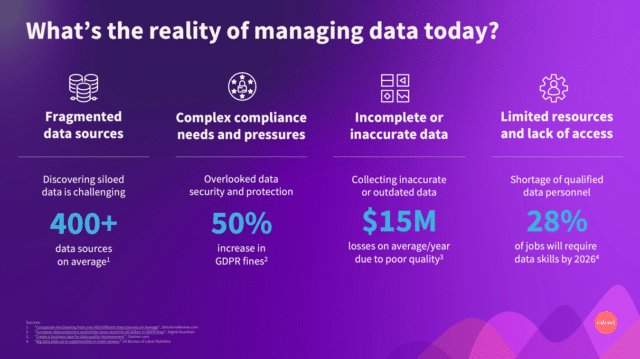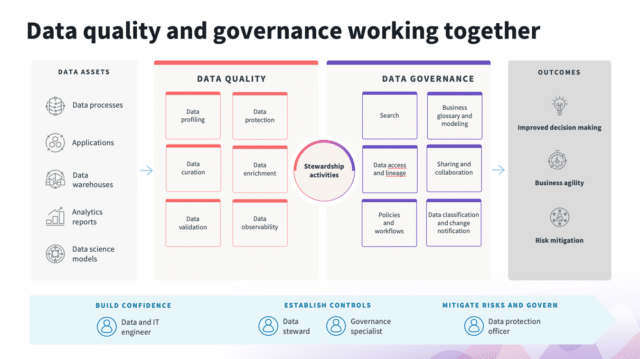Less effort, better business outcomes with data quality and governance

Achieving business success and making informed decisions requires high-quality data that organizations can trust. However, achieving data quality can be complex and time-consuming, forcing data and analytics leaders to choose between supporting business outcomes and ensuring compliance with data privacy and regulatory needs. Here’s how organizations can achieve business outcomes and compliance with regulations and privacy policies.
Data is often referred to as the new oil for a good reason. In today’s digital age, we are generating and collecting data at an unprecedented pace. As Sir Tim Berners-Lee said, "This precious resource will last longer than the systems themselves." IDC projects that by 2025, we will hit 175 Zettabytes of data. However, the challenge for businesses is how to turn this raw data into valuable insights. This is where data quality and governance come in.
The reality of managing data today involves several challenges for businesses. Fragmented data sources, complex compliance needs and pressures, incomplete or inaccurate data, limited resources, and lack of access are all issues that need to be addressed. Data is often siloed across different sources, leading to data discovery and consistency challenges.

Furthermore, the growing regulatory compliance needs require data security and privacy regulations to be met to avoid fines and a bad reputation. Moreover, the human element in data systems, including manual data entry and automation code written by humans, can affect data quality and have downstream consequences. Finally, a shortage of qualified data professionals or lack of data access can result in longer wait cycles to get the job done.
Building better business outcomes
Organizations must use data as an asset to succeed. Success comes in many forms, including improving operational efficiency and reducing costs, meeting regulatory compliance, improving decision-making and competitiveness, and promoting organizational transparency and trust through data democratization. However, all of this must happen in an automated, scalable, and sustainable way. Therefore, businesses must carefully balance data access and democratization speed with compliance regulations and policies.
Establishing data excellence involves a combination of data quality and governance, which work symbiotically. Data quality and governance tools are initially used, and data governance is a continuous process audited frequently with stewardship activities. Data quality and governance is a team sport, and everyone in the organization should have a role to play and data literacy, with a common goal of establishing data excellence.
Must-haves in data quality and governance
Certain must-haves in data quality and governance solutions must be present to achieve data excellence. When connecting different data sources, data profiling is crucial in assessing data quality for completeness, accuracy, timeliness, and consistency. Profiling saves time and helps identify inaccuracies quickly. It is necessary to curate data by organizing and managing datasets to meet business needs, cleansing, standardizing, converting, splitting, formatting, and transforming data to shape it for the business. Data validation ensures that the data conforms to various standards and is within acceptable business parameters. Masking and obfuscation protect sensitive data, while business and enrichment improve the overall context by blending data with other sources.

Finally, data observability focuses on completeness, accuracy, uniqueness, timeliness, anomalies, changes in the data pipeline, infrastructure, lineage, and availability.
Data quality and governance are essential in today’s business landscape. Without them, it is impossible to turn raw data into valuable insights. Businesses that establish data excellence will improve operational efficiency, reduce costs, meet regulatory compliance, improve decision-making and competitiveness, and promote organizational transparency and trust through data democratization. With the right data quality and governance solutions, organizations can achieve this balance in an automated, scalable, and sustainable way.
Image credit: nialowwa/depositphotos.com
Daniel Mayer is VP of Product Management, Talend.
